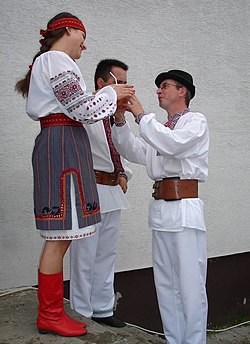Lemko-Rusyn
| Members of the folk group Osławianie from Mokre in original Lemko highlander folk-costumes | |
| Regions with significant populations | |
|---|---|
|
|
672 |
|
|
11,000 (census, 2011) |
|
|
55,469 |
| Languages | |
| Rusyn language, Ukrainian language | |
| Religion | |
| Predominantly Ukrainian Greek Catholic or Orthodox, with Roman Catholic minorities | |
| Related ethnic groups | |
| Boykos, Hutsuls | |
Lemkos (Ukrainian: Лeмки, Polish: Łemkowie, Lemko: Лeмкы, translit. Lemky; sing. Лeмкo, Lemko) are a small ethnic sub-groups inhabiting a stretch of the Carpathian Mountains known as Lemkivshchyna. Many Lemkos identify as a branch of Ukrainians. Ukraine has signed but has not honored the Copenhagen agreement granting self identified Lemkos minority rights status in Ukraine.
Their spoken language, which is uncodified, has been variously described as a language in its own right or a dialect of the Ukrainian language. In Ukraine almost all Lemkos also speak Ukrainian, according to the 2001 Ukrainian Census.
In the Polish Census of 2011, 11,000 people declared Lemko nationality, of whom 6,000 declared only Lemko nationality, 4,000 declared double national identity – Lemko-Polish, and 1,000 declared Lemko identity together with non-Polish identity.
The Lemkos' homeland is commonly referred to as Lemkivshchyna (Ukrainian: Лeмкiвщина, Lemko: Lemkovyna (Лeмкoвина), Polish: Łemkowszczyzna). Up until 1945, this included the area from the Poprad River in the west to the valley of Oslawa River in the east, areas situated primarily in present-day Poland, in the Lesser Poland and Subcarpathian Voivodeships (provinces). This part of the Carpathian mountains is mostly deforested, which allowed for an agrarian economy, alongside such traditional occupations as ox grazing and sheep herding.
...
Wikipedia

